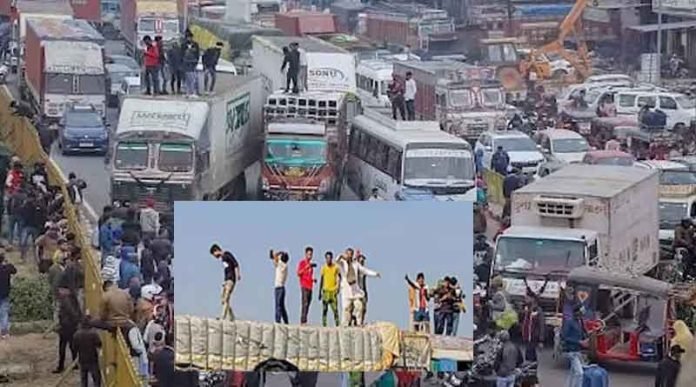INVC NEWS
New Delhi : The recent implementation of stringent Hit and Run laws has inadvertently sparked a crisis, leaving people grappling with a shortage of essential goods and services. This article sheds light on the unexpected ramifications of the new legislation, exploring its impact on the availability of vital necessities.
The Unforeseen Dilemma
1. Transportation Standstill
The nationwide strike by transporters and truck drivers has resulted in a virtual standstill in transportation, causing a domino effect on the supply chain.
2. Essential Goods Stranded
The disruption in the movement of goods has left essential items stranded, contributing to scarcity in local markets.
Stranded Cities: A Closer Look
3. Urban Chaos
Cities are experiencing chaos as the absence of regular transportation has hindered the flow of daily supplies, leading to shortages in groceries and other crucial commodities.
4. Impact on Healthcare
The scarcity is particularly pronounced in the healthcare sector, with medical supplies and medicines facing delays in delivery.
Regional Perspectives
5. Challenges in Chhindwara
Chhindwara, one of the epicenters of the strike, is witnessing a severe shortage of essential commodities, affecting the daily lives of its residents.
6. Ripple Effect on Rural Areas
The crisis isn’t limited to urban areas, as rural regions are also experiencing difficulties in accessing necessary supplies.
The Human Toll
7. Health and Nutrition Concerns
The shortage is exacerbating health and nutrition concerns, with individuals struggling to procure basic food items.
8. Economic Impact on Small Businesses
Small businesses, reliant on a steady supply chain, are grappling with economic losses, further deepening the crisis.
The Urgency of Resolution
9. Calls for Swift Action
There is a growing demand for swift resolution between the concerned parties to alleviate the impact on the general populace.
10. Government Intervention
The role of the government in mediating discussions and finding a middle ground to resume normal transportation operations.
Looking Ahead
11. Reconsidering the Legislation
The unintended consequences underscore the need for a reevaluation of the Hit and Run laws, taking into account their broader impact on society.
12. Balancing Safety and Essential Needs
Exploring avenues to strike a balance between ensuring road safety and guaranteeing the uninterrupted availability of essential goods.
Conclusion
In conclusion, the unintended fallout of the new Hit and Run laws has created a crisis, with people facing shortages of essential goods. As the standoff continues, there is an urgent need for dialogue and resolution to mitigate the adverse effects on the general population.
Frequently Asked Questions
1. How have the new Hit and Run laws contributed to shortages of essential goods?
The nationwide strike by transporters and truck drivers, in protest of the new laws, has disrupted the transportation of essential goods, leading to shortages.
2. Which sectors are particularly affected by the shortage of essential items?
The healthcare sector is significantly affected, with delays in the delivery of medical supplies and medicines. Additionally, urban and rural areas are facing challenges in accessing daily necessities.
3. What measures are being taken to address the crisis?
Calls for swift government intervention and a reconsideration of the legislation are being made to find a resolution and alleviate the impact on the general populace.
4. How are small businesses coping with the economic losses resulting from the shortage?
Small businesses, heavily reliant on a steady supply chain, are facing economic challenges due to the disruption, highlighting the need for a prompt resolution.
5. Is there hope for a quick resolution to the crisis?
Efforts are being made for dialogue and resolution between the concerned parties, emphasizing the urgency of addressing the crisis to minimize its impact on people’s lives.











